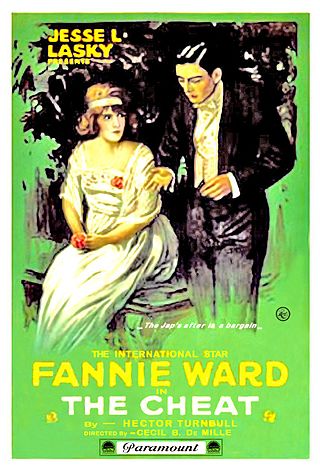
The Cheat is a 1915 American silent drama film directed by Cecil B. DeMille, starring Fannie Ward, Sessue Hayakawa, and Jack Dean, Ward's real-life husband.
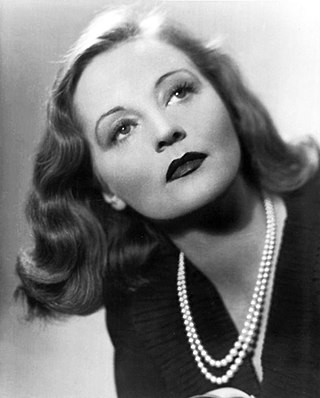
Tallulah Brockman Bankhead was an American actress. Primarily an actress of the stage, Bankhead also appeared in several prominent films including an award-winning performance in Alfred Hitchcock's Lifeboat (1944). She also had a brief but successful career on radio and made appearances on television. In all, Bankhead amassed nearly 300 film, stage, television and radio roles during her career. She was inducted into the American Theater Hall of Fame in 1972 and the Alabama Women's Hall of Fame in 1981.
A cheat is someone who engages in cheating.

Margaret Livingston, sometimes credited as Marguerite Livingstone or Margaret Livingstone, was an American film actress and businesswoman during the silent film era. She is remembered today as "the Woman from the City" in F. W. Murnau's 1927 film Sunrise: A Song of Two Humans.
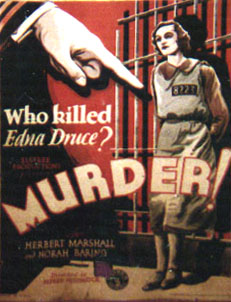
Murder! is a 1930 British thriller film co-written and directed by Alfred Hitchcock and starring Herbert Marshall, Norah Baring and Edward Chapman. Written by Hitchcock, his wife Alma Reville and Walter C. Mycroft, it is based on the 1928 novel Enter Sir John by Clemence Dane and Helen Simpson. It was Hitchcock's third all-talkie film, after Blackmail (1929) and Juno and the Paycock (1930).

They Won't Believe Me is a 1947 American film noir directed by Irving Pichel and starring Robert Young, Susan Hayward and Jane Greer. It was produced by Alfred Hitchcock's longtime assistant and collaborator, Joan Harrison. The film was made and distributed by Hollywood major studio RKO Pictures.

Smart Money is a 1931 American pre-Code drama film produced and distributed by Warner Bros., directed by Alfred E. Green, and starring Edward G. Robinson and James Cagney. It is the only occasion Robinson and Cagney appeared in a film together, despite being the two leading actors, mainly portraying gangsters, at Warner Bros. studios throughout the 1930s. Smart Money was shot after Robinson's signature film Little Caesar had been released and during the filming of Cagney's breakthrough performance in The Public Enemy, which is how Cagney came to play a supporting role.
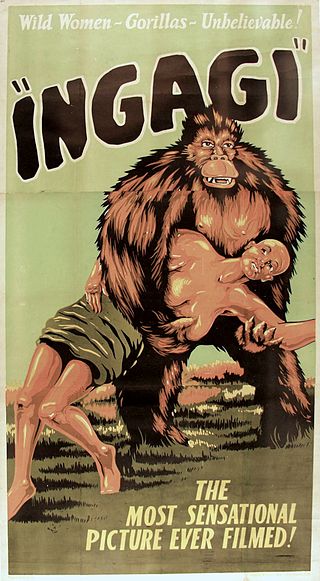
Ingagi is a 1930 pre-Code pseudo-documentary exploitation film directed by William S. Campbell. It purports to be a documentary about "Sir Hubert Winstead" of London on an expedition to the Belgian Congo, and depicts a tribe of gorilla-worshipping women encountered by the explorer. The film claims to show a ritual in which African women are given over to gorillas as sex slaves, but in actuality was mostly filmed in Los Angeles, using American actresses in place of natives. It was produced and distributed by Nat Spitzer's Congo Pictures, which had been formed expressly for this production. Although marketed under the pretense of being ethnographic, the premise was a fabrication, leading the Motion Picture Producers and Distributors Association to retract any involvement.

Irving Pichel was an American actor and film director, who won acclaim both as an actor and director in his Hollywood career.
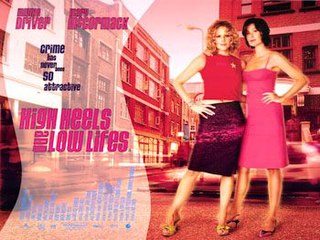
High Heels and Low Lifes is a 2001 action comedy-drama film starring Minnie Driver, Mary McCormack, Kevin McNally, Mark Williams, Danny Dyer and Michael Gambon. It was directed by Mel Smith and written by Kim Fuller and Georgia Pritchett.

Little Lord Fauntleroy is a 1936 American drama film based on the 1886 novel of the same name by Frances Hodgson Burnett. The film stars Freddie Bartholomew, Dolores Costello, and C. Aubrey Smith. The first film produced by David O. Selznick's Selznick International Pictures, it was the studio's most profitable film until Gone with the Wind. The film is directed by John Cromwell.

The Little Foxes is a 1941 American drama film directed by William Wyler. The screenplay by Lillian Hellman is based on her 1939 play The Little Foxes. Hellman's ex-husband Arthur Kober, Dorothy Parker and her husband Alan Campbell contributed additional scenes and dialogue.

Kiki is a 1931 American pre-Code romantic comedy, starring Mary Pickford and Reginald Denny, which was directed by Sam Taylor. It was based upon the David Belasco play of the same name. The film is a remake of the 1926 version starring Norma Talmadge.

Tarnished Lady is a 1931 American pre-Code drama film directed by George Cukor and starring Tallulah Bankhead and Clive Brook. The screenplay by Donald Ogden Stewart is based on his short story, A Story of a New York Lady.

Broken Lullaby is a 1932 American pre-Code drama film directed by Ernst Lubitsch and released by Paramount Pictures. The screenplay by Samson Raphaelson and Ernest Vajda is based on the 1930 play L'homme que j'ai tué by Maurice Rostand and its 1931 English-language adaptation, The Man I Killed, by Reginald Berkeley.

Faithless is a 1932 American pre-Code romantic drama film about a spoiled socialite who learns a sharp lesson when she loses all her money during the Great Depression. The film stars Tallulah Bankhead and Robert Montgomery and is based on Mildred Cram's novel Tinfoil, which was the film's working title.

The Scarlett O'Hara War is a 1980 American made-for-television drama film directed by John Erman. It is based on the 1979 novel Moviola by Garson Kanin. Set in late 1930s Hollywood, it is about the search for the actress to play Scarlett O'Hara in the much anticipated film adaptation of Gone with the Wind (1939). This film premiered as the finale of a three-night TV miniseries on NBC called Moviola: A Hollywood Saga.
Let Us Be Gay is a 1930 American pre-Code romantic comedy-drama film produced and distributed by MGM. It was directed by Robert Z. Leonard and stars Norma Shearer. It was based on and filmed concurrently with the 1929 play by Rachel Crothers which starred Tallulah Bankhead and ran for 128 performances at London's Lyric Theater. Critics generally preferred Tallulah's rendition to Shearer's.

Harvey Stephens was an American actor, known initially for his performances in Broadway productions, and thereafter for his work in film and on television. He was most active in film beginning in the 1930s and through the mid-1940s. Beginning in the mid-1950s, he transitioned to television and enjoyed success there through the 1960s.
My Sin is a 1931 American pre-Code drama film directed by George Abbott, and written by Abbott, Owen Davis, Adelaide Heilbron. It was adapted from the play, Her Past, written by Frederick J. Jackson. The film stars Tallulah Bankhead, Fredric March, Harry Davenport, Scott Kolk, and Lily Cahill. The film was released on October 3, 1931, by Paramount Pictures.

















